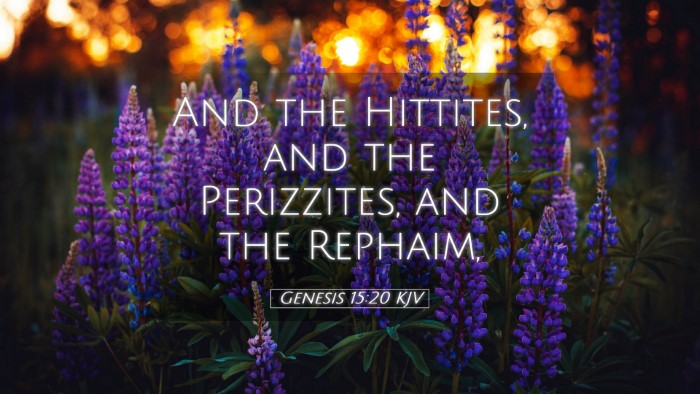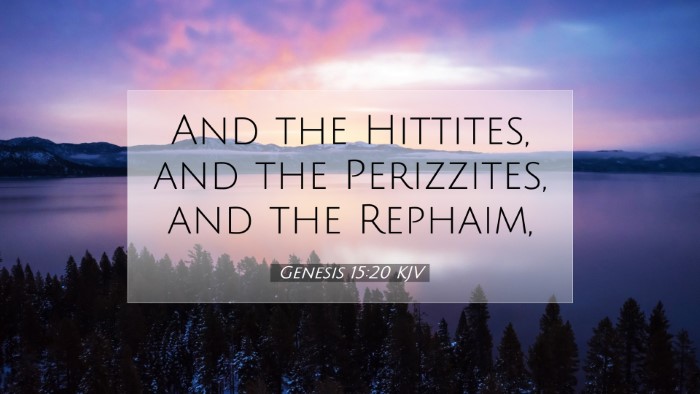Commentary on Genesis 15:20
Verse: "And the Amorites, and the Canaanites, and the Girgashites, and the Jebusites." (Genesis 15:20)
Introduction
This verse forms part of the covenant that God made with Abraham, detailing the land that would belong to his descendants. The four groups mentioned—Amorites, Canaanites, Girgashites, and Jebusites—represent various peoples inhabiting the land that God promised to Abraham. Understanding the implications of this verse requires a close examination of God’s covenantal promise, the significance of these people in biblical history, and the spiritual lessons that can be derived from this passage.
Contextual Analysis
This Scripture is situated within the broader narrative of Genesis 15, where God reaffirms His promises to Abram (later Abraham). God assures Abram of numerous descendants and gives him specific details about the land they will inhabit. The mention of these tribes illustrates the reality that Abraham’s descendants will face both the promise of inheritance and the obstacle posed by the current inhabitants.
Insights from Public Domain Commentaries
Matthew Henry’s Commentary
Henry emphasizes the sovereign choice of God to give Abram the land occupied by these tribes. He remarks that God’s promises encompass both hardship and hope. The listed nations served as reminders of the challenges Abraham’s progeny would encounter on their journey. Despite these challenges, the divine assurance serves to strengthen faith in God’s ultimate deliverance. Henry notes, "It is God that gives the land, though it be possessed by armories of men." This asserts that regardless of human resistance, God's will prevails.
Albert Barnes’ Notes on the Bible
Barnes elaborates on the significance of the names of the tribes mentioned, linking them to the history of Israel. Each group represents opposition and challenges that Israel would confront as they entered the Promised Land. Barnes states that God revealed the inhabitants to ensure Abram’s understanding of the future struggles. The mention of these nations serves as a prelude to the conquest narratives found later in Exodus through Joshua. Barnes reminds readers that God's promises involve both inheritance and warfare, which is a central theme throughout the Scriptures.
Adam Clarke’s Commentary
Clarke provides insight into the cultural context of these tribes, discussing their practices and how they conflicted with the covenantal lifestyle God desired for His chosen people. Clarke posits that understanding the moral and spiritual depravity of these nations underscores the necessity for Israel to engage in the conquest as part of God's judgment. He interprets this as not only a physical battle but also a spiritual warfare, as these nations represented both a literal and figurative impediment to the realization of God’s purposes in Israel. He emphasizes the idea that God's people must be prepared to confront and overcome these challenges to fulfill their divine destiny.
Theological Implications
The inclusion of these tribes highlights fundamental theological themes. First, there is the theme of God's sovereignty. The Lord expresses His authority over the land and its inhabitants. Second, the element of struggle and conflict in the pursuit of God’s promises is introduced. The future generations of Abram will experience both blessing and trial, reminding believers today that divine promise often walks hand-in-hand with enduring perseverance.
Lessons for Pastors and Theologians
- Faith and Inheritance: Just as Abraham had to trust in the promise of land, modern believers are called to have faith in God’s promises, often without immediate evidence of their fulfillment.
- Preparation for Conflict: The challenges represented by the Amorites, Canaanites, Girgashites, and Jebusites reflect the spiritual battles that Christians face today. Pastors must prepare congregations to advance against opposition while holding firmly to God’s assurances.
- God’s Justice and Mercy: The eventual conquest reveals both God's justice against the nations and His mercy towards His people, which can be explored in sermon contexts.
Conclusion
Genesis 15:20 is not merely a catalog of nations, but a profound statement about God’s intentions for Israel and the nature of His covenant. Through the insights of prominent biblical scholars, this verse invites further reflection on the interplay between divine promises and human realities. It serves as a reminder to contemporary readers of the importance of faithfulness in the face of adversity and the assurance that God's plans will ultimately prevail, regardless of the opposition. As students and scholars dive deeper into this text, it serves to encourage perseverance and reliance on God’s unfailing promises.


